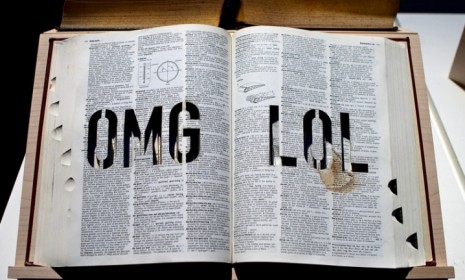Is 'OMG!' really a word?
The Oxford English Dictionary will now include the exclamatory online acronym, prompting critics to respectfully ask, "WTF?"

A free daily email with the biggest news stories of the day – and the best features from TheWeek.com
You are now subscribed
Your newsletter sign-up was successful
Linguistic traditionalists are up in arms after the publishers of the venerable Oxford English Dictionary (OED) announced they were welcoming some new additions to its pages — including the email-popularized acronyms "OMG" (Oh my God) and "LOL" (Laughing out loud). The acronym "FYI" (For your information) has also received the dictionary's approval. Outraged critics say "Samuel Johnson is rolling in his grave" over this outbreak of teenspeak in the world's most esteemed dictionary. Was the OED right to add these TLAs (Three letter acronyms) to its list of words?
No! The OED is SBB*: What was the OED thinking, asks Alexandra Petri at The Washington Post. It has added these "mutilations of language" simply to appear "hip and relevant." But the dictionary is "supposed to enshrine the words that actually mean things," not legitimize teen slang. Listen up, OED: "Stop trying to be cool and do your job."
"Stop it, Oxford English Dictionary. OMG? LOL? Heart? No!"
The Week
Escape your echo chamber. Get the facts behind the news, plus analysis from multiple perspectives.

Sign up for The Week's Free Newsletters
From our morning news briefing to a weekly Good News Newsletter, get the best of The Week delivered directly to your inbox.
From our morning news briefing to a weekly Good News Newsletter, get the best of The Week delivered directly to your inbox.
Yes. CMIIW**, but people use these words: The OED's job is to reflect changes in our linguistic culture, says Nate Anderson at Wired. And these acronyms are increasingly used in actual conversation. I'll admit that "[LOL] may have once even escaped my lips." This isn't "linguistic decline," but the type of evolution that has made English "one of the world's richest languages."
"People officially say 'LOL' out loud"
This isn't news IMHO***: "This is such non-news I wasn't even going to blog it," sighs The Economist. It's been the same story since Websters first introduced "ain't" back in 1961: "Grouches calling it embarrassing," and dictionary makers say "this is exactly what dictionaries are for." Surely the more interesting news is the dictionary's entry for ♥ — as in I ♥ New York — "defined as the transitive verb meaning 'to love.'" Is this the first "pronounceable symbol" to become a word?
A free daily email with the biggest news stories of the day – and the best features from TheWeek.com
* Stupid Beyond Belief
** Correct Me If I'm Wrong
*** In My Humble Opinion
-
 Switzerland could vote to cap its population
Switzerland could vote to cap its populationUnder the Radar Swiss People’s Party proposes referendum on radical anti-immigration measure to limit residents to 10 million
-
 Political cartoons for February 15
Political cartoons for February 15Cartoons Sunday's political cartoons include political ventriloquism, Europe in the middle, and more
-
 The broken water companies failing England and Wales
The broken water companies failing England and WalesExplainer With rising bills, deteriorating river health and a lack of investment, regulators face an uphill battle to stabilise the industry